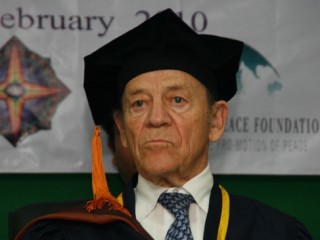
Torsten N. Wiesel biography
Date of birth : 1924-06-03
Date of death : -
Birthplace : Uppsala, Sweden
Nationality : Swedish
Category : Science and Technology
Last modified : 2011-12-15
Credited as : neurobiologist, chair of the Committee of Human Rights, Nobel Prize for Medicine in 1981
0 votes so far
Wiesel was awarded the Nobel Prize for Medicine in 1981, along with his long-time collaborator David H. Hubel, for mapping the visual or striate cortex, the posterior section of the cerebral cortex. Roger W. Sperry shared that year's Nobel honors, for work conducted at CalTech. Wiesel also demonstrated the importance of early diagnosis of childhood visual problems.
When a reporter informed him he had won the Nobel Prize, Wiesel's first response was, "Oh, no, I was afraid of that", explaining that he feared the hubbub might prove a distraction from his work. In the 1990s he was President of Rockefeller University, and since 2000, he has been Secretary-General of the Human Frontier Science Program, a group which supports collaboration across different scientific fields. He also served more than a decade as Chair of the Human Rights Committee for the National Academy of Sciences.
In 2001, he was named to a high-level post at the National Institutes of Health, but his nomination was scuttled by then-Secretary of Health and Human Services Tommy Thompson, with the official explanation that he had "signed too many full-page letters in the New York Times critical of President Bush." Wiesel responded, "I have not signed a statement against Bush, but nonetheless for some reason I am on the administration's blacklist. Perhaps [it is because of] my human rights activities and being contrary in general."
Wiesel was among the eight 2005 recipients of the National Medal of Science.In 2006, he was awarded the Ramon Y Cajal Gold Medal from the Spanish National Research Council (CSIC - Consejo Superior de Investigaciones Cientificas). In 2007, both Wiesel and Hubel were awarded the Marshall M. Parks, MD Medal from The Children's Eye Foundation.
Wiesel has done much work as a global human rights advocate. He served for 10 years (1994–2004) as chair of the Committee of Human Rights of the National Academies of Science in the U.S.A., as well as the International Human Rights Network of Academies and Scholarly Societies. He was awarded the David Rall Medal from the Institute of Medicine in 2005, in recognition of this important work.
He is a founding member of the Israeli-Palestinian Science Organization, a nongovernmental nonprofit established in 2004 to support collaborative research between scientists in Israel and Palestine.
In 2001, Wiesel was nominated for a position on an advisory panel in the National Institutes of Health to advise on assisting research in developing countries. Republican Tommy Thompson, who at the time was Secretary of Health and Human Services, rejected Wiesel. In addition to Wiesel, Thompson's office rejected another 18 (out of 26) nominations and in return recommended other scientists that whistleblower Gerald Keusch described in an interview as "lightweights" with "no scientific credibility". When Wiesel's name was rejected, an official in Thompson's office told Keusch that Wiesel had "signed too many full-page letters in The New York Times critical of President Bush." This incident was cited by the advocacy group Union of Concerned Scientists as part of a report detailing their allegations of abuse of science under President George W. Bush's administration.
Author of books:
-Brain Mechanisms of Vision (1991, with David H. Hubel)
-Colloquium on Vision: From Photon to Perception (200, with John Dowling and Lubert Stryer)
-Brain and Visual Perception: The Story of a 25-Year Collaboration (2005, with David H. Hubel)
















